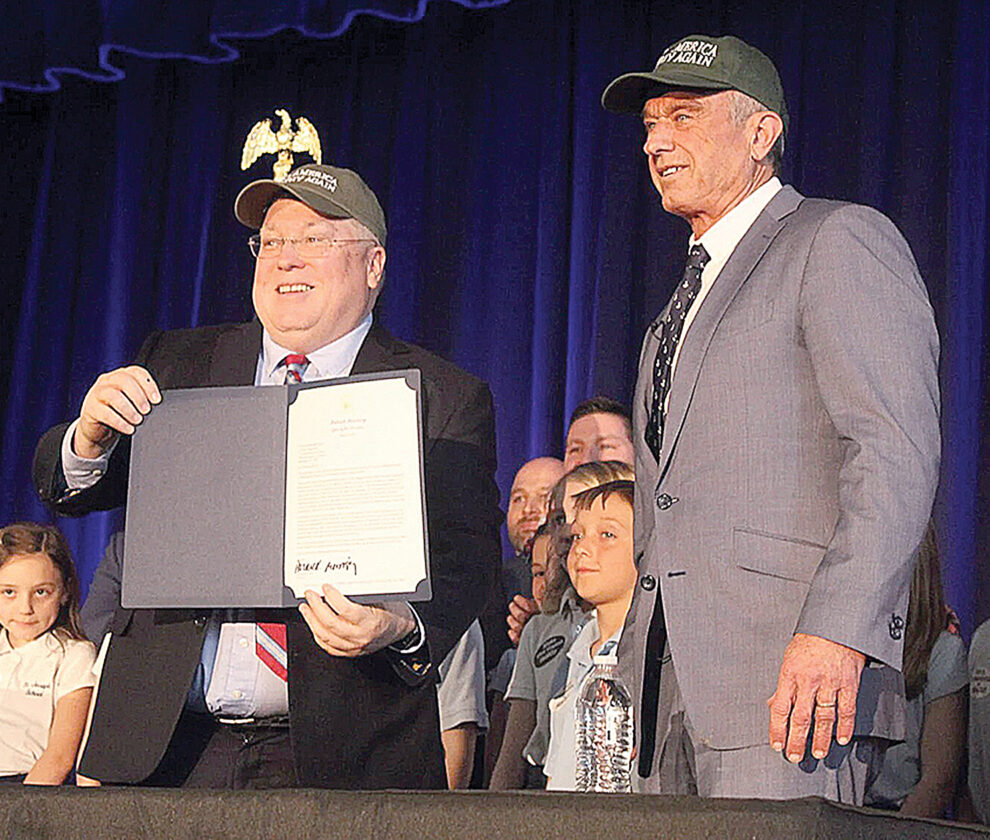Lawsuit filed challenging WV’s ban on certain dyes, additives

File photo Health and Human Service Secretary Robert F. Kennedy Jr., at right, and Gov. Patrick Morrisey signed a letter of intent earlier this year for West Virginia to file multiple SNAP waivers with the federal government.
CHARLESTON — A national trade group representing businesses that manufacture food dyes is taking West Virginia to court over its new law banning certain food dyes, additives and preservatives.
The International Association of Color Manufacturers (IACM) filed a federal lawsuit on Oct. 6 in the U.S. District Court for the Southern District of West Virginia against the West Virginia Department of Health and the state Board of Education.
The IACM is seeking an order and judgement from the court declaring that House Bill 2354, banning certain products from food in West Virginia, violates both the state and U.S. constitutions, a preliminary and permanent injunction blocking enforcement of HB 2354 against color manufacturers and allowing the sale of color additives, and award attorney fees to the IACM.
“To protect ingredient manufacturers and food companies, we are asking the U.S. District Court to immediately strike down West Virginia’s flawed ban,” said John H. Cox, general counsel for IACM, in a statement last week. “The statute arbitrarily and irrationally targets color additives no U.S. agency — state or federal — nor any court has ever found to be unsafe.”
HB 2354 amended State Code regarding adulterated food and drugs banning specific food additives and dyes found in processed food products sold in the state, such as red dye No. 3 and yellow dye No. 5, deeming them unsafe. Other prohibited additives include butylated hydroxyanisole, propylparaben, red dye No. 40, yellow dye No. 6, blue dye No. 1, blue dye No. 2, and green dye No. 3.
The bill also protects individuals in the state from criminal provisions in the bill as long as they sell less than $5,000 in aggregate food sales per month for products containing the banned food additives and dyes. Under State Code, individuals who knowingly contaminate food items for sale containing the banned food dyes and additives without informing the buyer could be charged with a misdemeanor and face potential fines up to $500, spend up to one year in prison or both, while also covering the costs of analyzing the adulterated substance.
The ban on food products would go into effect on Jan. 1, 2028. But restrictions in HB 2354 prohibit the inclusion of these dyes and additives in meals served in schools as part of nutrition went into effect Aug. 1.
According to the bill, schools would still be able to sell non-compliant items for fundraising purposes if sold off-premises or after school hours.
The U.S. Food and Drug Administration already banned red dye No. 3 in January, ordering its removal from food products by Jan. 15, 2027, and from ingested drugs by Jan. 18, 2028. Since being appointed by President Donald Trump as secretary of the U.S. Department of Health and Human Services, Robert F. Kennedy Jr. has made phasing out certain food dyes and additives a priority, securing deals with major food producers to stop using synthetic food dyes.
The IACM argues that HB 2354 is unconstitutional because it lacks a rational basis, arbitrarily prohibiting certain food dyes without providing medical evidence for those bans.
Carte Goodwin, one of several attorneys representing the IACM, wrote in last week’s court filing that the U.S. Food and Drug Administration (FDA) already regulates food dyes and additives.
“Against this backdrop, one would have imagined that if West Virginia were to suddenly ban color additives that were FDA-approved and used safely for decades, the Legislature would have done so (a) based on new, public, reliable scientific evidence (b) that would be reflected in a robust legislative record replete with findings of fact justifying such a ban,” Goodwin wrote.
“Nothing of the sort occurred,” Goodwin continued. “The statute itself and the legislative record contain no evidence supporting West Virginia’s ban. Nor could they have, because none exists.”
The IACM said HB 2354 violates equal protection guarantees in the U.S. Constitution; operates as an illegal bill of attainder, when a legislative act unfairly punishes an individual or group; and is unconstitutionally vague. In his statement, Cox said that the banned additives in HB 2354 are safe and FDA-approved, and the Legislature acted without scientific justification and created potential economic harm to the businesses that manufacture food dyes.
“IACM strongly supports the continued safe use of all FDA-approved color additives, including FD and C colors, which are among the most thoroughly studied and strictly regulated ingredients in food,” Cox said. “West Virginia’s ban isn’t supported by scientific evidence.”
The state Department of Health and the state Board of Education were not available for comment Monday.


